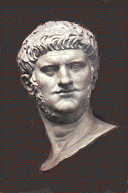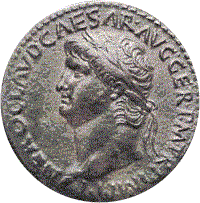The fifth Roman emperor was a great-great-grandson
of Augustus,
nephew of Caligula
& stepson of Claudius.
Born Lucius Domitius Ahenobarbus, his father died when he was three,
shortly before Caligula's assassination. His youth was dominated by
his ambitious mother, Agrippina,
who poisoned her 2nd husband to marry the emperor Claudius (49
CE),
whom she in turn poisoned (54 CE) after persuading the aging emperor
to adopt her son & name him his heir rather than Claudius'
natural son, Britannicus. Nero's full adopted name, Nero
Claudius Caesar Augustus Germanicus,
represented him as descendent of Julius
Caesar, Augustus & Livia,
all of whom were worshipped by Romans as gods.
It is difficult to make an accurate
assessment of Nero, since he was so controversial in his own day.
Those whom he supported idolized him with excessive flattery. His
enemies, on the other hand, portrayed him as the greatest of
monsters. Josephus---who
lived through his reign, had an audience with him & even
persuaded him to release Jewish hostages on the very eve of the
Jewish revolt---complained that contemporary historians favorable to
Nero were "careless with the truth," while those hostile
to him "shamelessly & recklessly reveled in lies" [Antiquities
20.154]. None of the early favorable portraits of Nero survive,
while the hostile ones were preserved by Christian historians as
proof of their belief that Nero was the Anti-Christ. Within the last
generation, however, historians have developed a less one-sided
reconstruction of the man.
Nero's reign was heralded as the
golden age by the Senate & many in the Roman world who,
influenced by oracles & prophecies, were looking for the
appearance of a divine savior. The 17 year old emperor, who had been
tutored in the classics by the Stoic philosopher Seneca, set out to
play the part. He banned capital punishment & public spectacles
focused on bloodshed. He reduced taxes & gave slaves the right
to file complaints against their masters. Unlike previous emperors
he did not prosecute people under the laws against treason &
freely pardoned prisoners who were arrested for sedition, including
his own critics. To fill the entertainment void left by the absence
of gladiators, he sponsored theater, athletics & poetry
contests. And he gave the Senate greater freedom than at any time
since before the rise of Julius Caesar.
The benign laissez-faire
image that Nero cultivated in public, however, did not extend to his
private life. He murdered his mother (59 CE)---who herself had
poisoned most of his potential rivals--- & his first wife [Octavia,
the daughter of Claudius]. He gained a reputation for a scandalously
libertine night-life in the streets of Rome that shocked Roman
aristocrats. Freed from his domineering mother, he began to give
public recitals (poetry & lyre), stage performances &
chariot races. In his last years he dabbled in eastern mystery
cults. Yet, by 62 CE,
influenced by the dilettante patrician Gaius
Petronius [author of the Satyricon] & Ofonius
Tigellinus [head of the Praetorian guard] Nero abandoned himself to
extravagant orgies, while his secret police plunged Rome into a new
reign of terror. While posing as benefactor of the people, Nero was
blind to their real needs.
He responded to a fire that
devastated Rome (64 CE) by using the ground to build the largest
palace ever designed with a colossal gilded statue [120 ft. high] of himself as the sun
god. It was so widely rumored among the people that
Nero or Tigellinus had deliberately set the fire to build his
palace that [according to Tacitus] he blamed Christians, many of
whom were arrested & tortured to death. According to early
Christian tradition, the apostles Peter & Paul both died in this
persecution.
Dismayed at Nero's wasteful
extravagance, even his tutor Seneca joined a group of Roman nobles
who conspired to murder him. Yet when the plot was exposed (64 CE),
Nero sentenced less than half the conspirators to death. In late 66
CE he began a tour of religious shrines in Greece as a barefoot
pilgrim. Returning to Rome in 68 CE he established the cult of
Apollo in Rome, freed slaves & bestowed money freely on the
people. Such irresponsible extravagance inspired the Senate &
army to rebel. Even the Praetorian guard abandoned him. Forced to
flee Rome, he committed suicide at age 31. The political chaos after
his death ended the dynasty of the Caesars.
Among Christians Nero became infamous
for torturing Christians for the fire that devastated Rome. But
towards Romans, Jews & others he was often far less a tyrant
than his predecessors. He was obviously self-centered, irresponsible
& easily dominated by others whose political designs were less
than idyllic. Yet, the historical Nero was not as much a malevolent monster
as his uncle, Caligula. In the end he alienated the Roman army &
aristocracy not so much for his cruelty but for squandering the
imperial wealth & posing as benefactor of those people whom Rome
had spent centuries conquering & dominating.
References: Josephus,
Antiquities
20.150-162, 182-184, 194-195, 252-259.
_____, War
1.20-23; 2.248-253; 3.1-8; 4.491-497.
Tacitus, Annals
13.1-5, 12-21, 25, 29, 31, 34, 45-52;
14.1-16, 20-22, 39, 50- 65; 15.18, 22-23, 33-74;
16.1-3, 6-8, 10-11, 14, 18-26, 30.
Suetonius, Twelve
Caesars: Nero
Cassius
Dio, Roman History 60.31-35; 61.1-21; 62.13-29; 63.1-29
Philostratus, Life
of Apollonius
4.44
Other resources on line:


![]()
![]()

![]()
![]()
![]() Perspective on the World of Jesus
Perspective on the World of Jesus ![]()